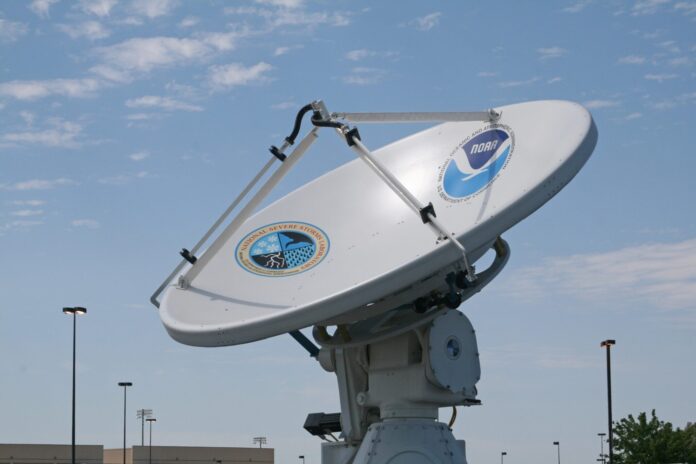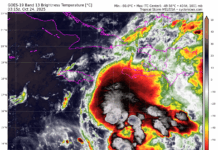
(States Newsroom) — Democrats on the U.S. House Natural Resources Committee and a panel of experts on Wednesday blasted the Trump administration’s reduction to the National Oceanic and Atmospheric Administration’s budget and workforce, citing consequences for everyday weather data, national security and affected industries.
Virtually every American interacts with NOAA’s weather data, which supplies forecasting services across the country.
The agency’s climate and oceanic research supports the U.S. Navy’s operations and even the commercial fishing industry – described during the forum as having “a love-hate relationship” with the agency – depends on NOAA to open and close fisheries, the lawmakers and experts said.
But those missions were imperiled in February by the firings of 7% of NOAA’s staff of scientists and others overseeing federal research and monitoring of weather and oceans, the group of Democrats said.
“These critical functions are being dismantled by the sweeping, indiscriminate layoffs of nonpartisan public servants and facility closures,” U.S. Rep. Seth Magaziner, a Rhode Island Democrat who led the forum, said.
The reductions in force at NOAA, which houses agencies including the National Weather Service, National Ocean Service, National Marine Fisheries Service, National Environmental Satellite, Data, and Information Service and the Office of Oceanic and Atmospheric Research, were part of across-the-board cuts to the federal workforce sought by President Donald Trump and billionaire White House adviser Elon Musk.
The group of Democrats, who met without involvement of the committee’s Republican majority, said the cuts would hurt a wide range of Americans who depend on the agency’s data collection and rulemaking.
Data collection and dissemination
One of NOAA’s core missions is collecting and publishing weather data across the country used in forecasting apps and other common sources of weather information.
“There is no weather forecast that’s produced in this country that isn’t dependent on NOAA, none” Mary Glackin, a former deputy under secretary for operations at the agency under presidents of both parties, said.
The availability of federal data made possible the creation of companies like Accuweather, which started by collecting data in a garage, Glackin said.
U.S. Navy Rear Admiral Jon White told the panel NOAA’s extensive forecasting data was also critical to naval operations, saying reductions in that data would hurt the military’s readiness, both shipping out of domestic stations and in potential conflict zones.
“Hurricane forecasting and typhoon forecasting rely on the data from NOAA, whether it’s satellite data,” White said. “Reductions in that data and that information provide critical threats to our military infrastructure. Ships that (start) out of Norfolk and San Diego rely on that information about upcoming storms, especially hurricanes on the East Coast. … It’s not just billions of dollars of ship damage: It’s lives that are at stake.”
Industry needs NOAA
Magaziner was the one who called the commercial fishing industry’s connection with NOAA “a love-hate relationship,” but he and witnesses noted that the agency oversees the most basic functions the industry needs to operate.
Sarah Schumann, a fisherman with operations in Rhode Island and Alaska, criticized President Joe Biden’s administration for allying too strongly with offshore wind developers, but said the new administration’s actions were also detrimental to the industry.
“These cuts will bog down the agency’s ability to serve the public for fishermen,” Schumann said. “Because of climate change, we desperately need faster, more nimble and more collaborative data collection and decision-making, and there is a very slim chance we’re going to get that with this.”
Trump’s slowdown of regulations – requiring federal agencies to withdraw 10 regulations for every one new regulation put into place – has also hampered commercial fishing operations.
Opening and closing fisheries for a season are done through NOAA rulemaking, environmental attorney Lizzie Lewis told the panel. Bluefin tuna fisheries were not closed on time and were overfished by 125% and fisheries in New England are unlikely to open on time, she said.
Efficiency?
The cuts, part of Musk’s initiative to make government more efficient, are not having their intended effect in streamlining government, Magaziner and others on the panel, including New Mexico’s Melanie Stansbury, said.
“The assertion that mass layoffs will somehow improve efficiency is not only misleading, it is outright dangerous,” Magaziner said. “Real people, real jobs and real lives are on the line. Without NOAA’s real-time data, emergency responders are left without the critical information they need to respond to impending disasters like wildfires, hurricanes, floods and severe storms putting millions at risk.”
The layoffs also decimated morale at the agency and made attracting qualified young people to its public service mission more difficult, Lewis told the panel.
“We are losing an entire generation of scientists and leaders who can help this country,” Lewis said. “We can keep its people safe and can grow its economy. And that to me is the devastating human cost.”






